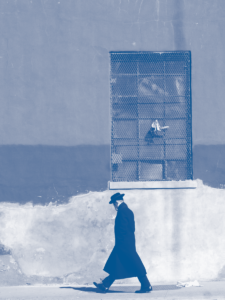Since the war in the Gaza Strip began on October 7, the question ever-present in American Jewish minds persists: what does this mean for antisemitism? By the ADL’s count, there has been a notable surge in reports of antisemitism: approximately 3,000 reported incidents since Oct. 7. Ultimately, for most of the respondents, the uptick means that antisemitism has pervaded their communities and country at levels not previously felt. We’ve compiled and summarized recent polling on Jewish perceptions of antisemitism with the hope that we can offer a snapshot of this unsettling moment for American Jews.
In research conducted by the Jewish Federations of North America in November, ninety-seven percent of Jewish Americans reported feeling that there was some or a lot of antisemitism in the United States. When asked about its transformation in the past five years, the data gets grimmer: 86% of Jewish respondents believe it has worsened. This sentiment is also reflected in the Jewish Electorate Institute’s findings, which show a twenty-percent increase in the level of concern from Jewish voters, a jump from 59% percent of deep concern in April 2022 to 79% in November 2023.
97% of Jewish Americans reported feeling that there was some or a lot of antisemitism in the United States. When asked about its transformation in the past five years, the data gets grimmer: 86% of Jewish respondents believe it has worsened.
National conversations surrounding antisemitism have focused substantially on college campuses. A joint report from the ADL and Hillel International features a longitudinal survey of college students and compares antisemitism on campus before and after Oct. 7. Findings show that nearly three out of four Jewish college students personally experienced or witnessed antisemitism during the mere first months of the 2023-2024 school year, which is an increase from 70% across the entire college experience in previous years. Feelings of both physical and emotional safety on campus for these students also plummeted, and they reported an increasing discomfort with disclosing their Jewish identity to non-Jewish students.
Findings from a Brandeis University poll of 51 American college campuses echo this reality. Jewish students on campuses with greater antisemitic hostility were less likely to feel safe, comfortable, or that they belong at school. The reported antisemitism on campus is related to criticism of Israel, and more students felt concerned about anti-Israel hostility than other forms of antisemitism. On campuses with above average antisemitic hostility, 81% of respondents sometimes or often encountered anti-Israel aggression from other students.
The backdrop of American Jewish attitudes toward Israel is contextually helpful for interpreting sentiments of rising hate and opinions on the war. In 2020, the Pew Research Center reported that 82% of Jewish American adults said caring about Israel is an essential or important part of their Jewish identity. However, Jews only comprise 2.4% of all U.S. adults. When asked by YouGov on November 9, 2023 on their sympathies, Americans were split: 37% back Israel, 15% stand with Palestine, and almost half comprised the remaining responses of seeing both sides or feeling unsure. This data may correspond to age, as a Brookings poll suggests. While Israel gained a net 46% gain of support from baby boomers, the youngest generation involved in politics swung for Palestine by 2%. Indeed, younger respondents in almost every poll were more likely to support the Palestinian cause than their elders.
Beyond the United States, the Institute for Jewish Policy Research reports that British attitudes toward Israel similarly differ across different age groups. Regarding the war, only 12% of those aged 18-24 support Israel’s military actions in Gaza while 47% of seniors over 65 held this view. However, broadly across all British adults, one in ten had more sympathy for Israelis, whereas roughly one quarter’s sympathies were with the Palestinains. This divisiveness is sharpest in Israel, where many Israelis are losing hope for a two-state solution. In the weeks prior to October 7, the Pew Research Center found that in the past decade both Arab and Jewish Israelis have felt less confident in a peaceful coexistence with an independent Palestinian state.
However one approaches this phenomenon and however one understands the relationship between anti-Zionism and antisemitism, recent polling reveals a few remarkable consistencies: Criticism of Israel is widespread, antisemitism is on the rise, and American Jews are worried. Younger Americans are far more likely to cast their sympathies with Palestinians than Israelis, while older Americans expressed the inverse.
Strategies for addressing this situation also represent a range of positions and perspectives, and we hope that this digest can and will help both those tasked with developing communal responses and those just trying to figure out what is going on.

